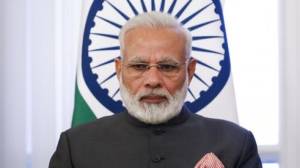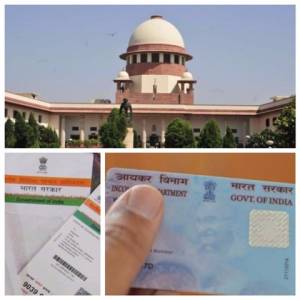Explorer
Setback to Modi govt: Overruling 2 earlier judgments, SC rules Right To Privacy a Fundamental Right
Judges unanimously overruled 2 earlier judgments of the apex court that Right To Privacy is not protected under Constitution.

A 9-judge Constitution bench headed by CJI Justice JS Khehar ruled, on Thursday, Right To Privacy protected intrinsically as part of rights under Article 21.
New Delhi: In a landmark judgment on Thursday, Supreme Court ruled that Right To Privacy is a fundamental right, but the government can put reasonable restrictions on it. The ruling is a setback for NDA led Narendra Modi government. It will also impact government's Aadhaar policy.  Image: AP/File 9-judge Constitution bench headed by CJI Justice JS Khehar ruled Right To Privacy protected intrinsically as part of rights under Article 21. Judges unanimously overruled 2 earlier judgments of the apex court that Right To Privacy is not protected under Constitution. What happened in earlier two judgement?
Image: AP/File 9-judge Constitution bench headed by CJI Justice JS Khehar ruled Right To Privacy protected intrinsically as part of rights under Article 21. Judges unanimously overruled 2 earlier judgments of the apex court that Right To Privacy is not protected under Constitution. What happened in earlier two judgement?  The two apex court judgements delivered in the cases of Kharak Singh and M P Sharma, decided by six and eight judge benches respectively, ruled that this right was not a fundamental right. The Kharak Singh judgement was delivered in 1960, the M P Sharma verdict was reported in 1950. What is Right To Privacy? The right to privacy is an ingredient of various legal traditions to restrain government and private actions that threaten the privacy of individuals and over 150 national constitutions mention the right to privacy. Since the global surveillance disclosures (2013), the inalienable human right to privacy has been a subject of international debate and discussion. In fighting worldwide terrorism, government agencies (like NSA, CIA, R&AW, and GCHQ) have engaged in mass, global surveillance, possibly undermining the right to privacy. However, this has given rise to a question as to whether the right to privacy can co-exist with the current capabilities of intelligence agencies to access and analyse virtually every detail of an individual's life? This has in turn given rise to another major question that whether or not the right to privacy needs to be sacrificed as part of the social contract to support defense against supposed terrorist threats. Centre termed privacy as a 'vague and amorphous' The Attorney General had contended that right to privacy cannot fall in the bracket of fundamental rights and the Centre had termed privacy as a "vague and amorphous" right which cannot be granted primacy to deprive poor people of their rights to life, food and shelter. What petitioners said about Right To Privacy? The petitioners contended that the right to privacy is "inalienable" and "inherent" to the most important fundamental right which is the Right To Liberty. According to petitioners, Right To Liberty, which also included right to privacy, was a pre-existing "natural right" which the Constitution acknowledged and guaranteed to the citizens of the country in case of infringement by the state.
The two apex court judgements delivered in the cases of Kharak Singh and M P Sharma, decided by six and eight judge benches respectively, ruled that this right was not a fundamental right. The Kharak Singh judgement was delivered in 1960, the M P Sharma verdict was reported in 1950. What is Right To Privacy? The right to privacy is an ingredient of various legal traditions to restrain government and private actions that threaten the privacy of individuals and over 150 national constitutions mention the right to privacy. Since the global surveillance disclosures (2013), the inalienable human right to privacy has been a subject of international debate and discussion. In fighting worldwide terrorism, government agencies (like NSA, CIA, R&AW, and GCHQ) have engaged in mass, global surveillance, possibly undermining the right to privacy. However, this has given rise to a question as to whether the right to privacy can co-exist with the current capabilities of intelligence agencies to access and analyse virtually every detail of an individual's life? This has in turn given rise to another major question that whether or not the right to privacy needs to be sacrificed as part of the social contract to support defense against supposed terrorist threats. Centre termed privacy as a 'vague and amorphous' The Attorney General had contended that right to privacy cannot fall in the bracket of fundamental rights and the Centre had termed privacy as a "vague and amorphous" right which cannot be granted primacy to deprive poor people of their rights to life, food and shelter. What petitioners said about Right To Privacy? The petitioners contended that the right to privacy is "inalienable" and "inherent" to the most important fundamental right which is the Right To Liberty. According to petitioners, Right To Liberty, which also included right to privacy, was a pre-existing "natural right" which the Constitution acknowledged and guaranteed to the citizens of the country in case of infringement by the state.
 Image: AP/File 9-judge Constitution bench headed by CJI Justice JS Khehar ruled Right To Privacy protected intrinsically as part of rights under Article 21. Judges unanimously overruled 2 earlier judgments of the apex court that Right To Privacy is not protected under Constitution. What happened in earlier two judgement?
Image: AP/File 9-judge Constitution bench headed by CJI Justice JS Khehar ruled Right To Privacy protected intrinsically as part of rights under Article 21. Judges unanimously overruled 2 earlier judgments of the apex court that Right To Privacy is not protected under Constitution. What happened in earlier two judgement?  The two apex court judgements delivered in the cases of Kharak Singh and M P Sharma, decided by six and eight judge benches respectively, ruled that this right was not a fundamental right. The Kharak Singh judgement was delivered in 1960, the M P Sharma verdict was reported in 1950. What is Right To Privacy? The right to privacy is an ingredient of various legal traditions to restrain government and private actions that threaten the privacy of individuals and over 150 national constitutions mention the right to privacy. Since the global surveillance disclosures (2013), the inalienable human right to privacy has been a subject of international debate and discussion. In fighting worldwide terrorism, government agencies (like NSA, CIA, R&AW, and GCHQ) have engaged in mass, global surveillance, possibly undermining the right to privacy. However, this has given rise to a question as to whether the right to privacy can co-exist with the current capabilities of intelligence agencies to access and analyse virtually every detail of an individual's life? This has in turn given rise to another major question that whether or not the right to privacy needs to be sacrificed as part of the social contract to support defense against supposed terrorist threats. Centre termed privacy as a 'vague and amorphous' The Attorney General had contended that right to privacy cannot fall in the bracket of fundamental rights and the Centre had termed privacy as a "vague and amorphous" right which cannot be granted primacy to deprive poor people of their rights to life, food and shelter. What petitioners said about Right To Privacy? The petitioners contended that the right to privacy is "inalienable" and "inherent" to the most important fundamental right which is the Right To Liberty. According to petitioners, Right To Liberty, which also included right to privacy, was a pre-existing "natural right" which the Constitution acknowledged and guaranteed to the citizens of the country in case of infringement by the state.
The two apex court judgements delivered in the cases of Kharak Singh and M P Sharma, decided by six and eight judge benches respectively, ruled that this right was not a fundamental right. The Kharak Singh judgement was delivered in 1960, the M P Sharma verdict was reported in 1950. What is Right To Privacy? The right to privacy is an ingredient of various legal traditions to restrain government and private actions that threaten the privacy of individuals and over 150 national constitutions mention the right to privacy. Since the global surveillance disclosures (2013), the inalienable human right to privacy has been a subject of international debate and discussion. In fighting worldwide terrorism, government agencies (like NSA, CIA, R&AW, and GCHQ) have engaged in mass, global surveillance, possibly undermining the right to privacy. However, this has given rise to a question as to whether the right to privacy can co-exist with the current capabilities of intelligence agencies to access and analyse virtually every detail of an individual's life? This has in turn given rise to another major question that whether or not the right to privacy needs to be sacrificed as part of the social contract to support defense against supposed terrorist threats. Centre termed privacy as a 'vague and amorphous' The Attorney General had contended that right to privacy cannot fall in the bracket of fundamental rights and the Centre had termed privacy as a "vague and amorphous" right which cannot be granted primacy to deprive poor people of their rights to life, food and shelter. What petitioners said about Right To Privacy? The petitioners contended that the right to privacy is "inalienable" and "inherent" to the most important fundamental right which is the Right To Liberty. According to petitioners, Right To Liberty, which also included right to privacy, was a pre-existing "natural right" which the Constitution acknowledged and guaranteed to the citizens of the country in case of infringement by the state. Related Video
Breaking News: “Land-for-Job” Scam: Lalu Yadav, Family Among 41 Accused as Court Frames Charges
Follow Breaking News on ABP Live for more latest stories and trending topics. Watch breaking news and top headlines online on ABP News LIVE TV





































